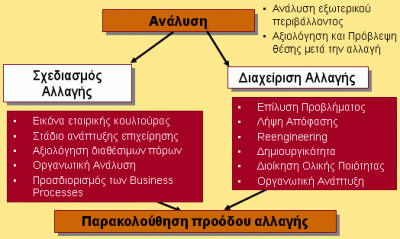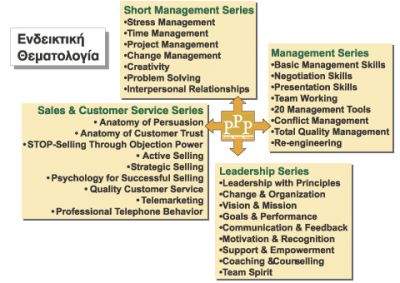The Academies of PPP Learn
This systemic approach of intervention in the corporate operations, is implemented through the formulation of “Academies”.
The content of the Academies is characterized by:
- A thorough organizational intervention, specified by a particular area on needs
- A sequence of development phases which includes: diagnosis, basic training, constant feedback, follow up, reinforcement, specialization.
- A carefully selected blend of different methodologies: personal evaluation, team evaluation, audiovisual training tools, systems for evaluating the effectiveness, use of new technologies, synchronous and asynchronous e-learning, blended learning…
The Academies, approach a wide range of occupational roles systematically, organize a model which interprets the particular needs and formulate a methodology proposal for the design of the intervention.
The structure of an Academy proposal specifies:
- The development objectives with regard to the anticipated results.
- The most appropriate course for learning, in relation to the circumstances/conditions in force.
Evidently, the Academy concept constitutes a flexible system for designing the development of human resources, and it is not simply another training program.
PPP Learn’s interventions in corporations in the last few years have brought it into a position of developing content and methodologies in the areas of sales, leadership and change management.
Sales Academy
Quite often, the only concern of someone who designs/prepares training for salespeople is the question “on which product or service?”
If one takes that as starting point, he/she will encounter difficulties in adapting the product’s sales process to the actual conditions in force, since the issue is more a matter of behaviour rather than knowledge.
More appropriate concerns would have been:
- For what kind of customer: Adaptation of the sales process to the characteristics of different types of customer behaviour.
- For what type of market/industry: Adaptation of the search process and of the way one approaches the particular product’s customer, to the specifics of the market/industry.
- For what expertise level of the salesperson: Adaptation of the learning process to the experience level of the salespeople, to the specific stage of their development, to their weak / strong points, to their personal development framework.
PPP Learn, utilizing Greek and international experience, has defined the following three sales models which relate to all industries/sectors.
Transaction/Interaction
The key factors affecting success are:
- The process and the systematic presentation to the customer; the competitive price; the quality of service; the ability to close the deal by a single interaction.
- The salesperson manages time; the only resource available to him/her.
- Customer loyalty is low, since the change of provider entails low cost.
The salespersons’ objective is to become a recipient of requests/orders.
Relationship
The key factors affecting success are:
- The relationship being sustained though time; trust as a result of experiencing the salespersons’ integrity, persuasion and influence on the decision to buy, ability for cultivating mutual respect.
- The salesperson, apart from time, also manages the relationship in the long term.
- Customer loyalty is higher.
The salesperson’s objective is to become the preferred/chosen provider.
Integration
The key factors affecting success are:
- The alignment of the company’s system to the customer’s system; the utilisation of the product/service by the customer’s management & productivity system; the ability for competitive differentiation; the development of a partnership type relationship.
- The salesperson manages a long term relationship, but in a more substantial way; he/she does not influence only the decision to buy, but also decisions relative to administration.
- Customer loyalty is very high; the customer tends to become bonded to the provider.
The salesperson’s objective – through the appropriate actions- is to earn the role of Business Partner.
The value of the PPP leadership model is derived from a prevailing ideological factor: the manager’s responsibility for developing his people.
This dynamic conception of the manager’s function, doesn’t in any way oppose the executive aspect of the manager’s role, but on the contrary unleashes the existing potential in line with the challenges and the corporate culture, for the achievement of excellence.
The PPP model is a proposal for development of a new management type, which has the power to transferring the “vision” and the strategy of the organizational unit into the day-to-day action.
This operational development is reflected in all organizational modes:
- In interpersonal relationships (one-to one)
- In the management of an organizational unit (one-to all)
- In the team activities (many-to many)
Keeping in mind each one of the model’s three organizational modes and the necessary skills for managing these modes, PPP has developed its own Leadership Academy.
Resistance to change, or feigning the very signs of change, can prove to be detrimental to the survival of the corporation. Creativity and innovation constitute the only response to the turbulence of the outside world. Strategic management of change cannot, in its entirety, rely exclusively on the voluntary disposition of management.
It is vital, that all investigation and analysis efforts, relative to the outside environment, be handled by change Agents, and to be followed by in-depth evaluation of the conditions inside the company, the corporate culture, the development phase (scope) of the company, the quality and reliability of the available resources.
Furthermore, it is vital to deal with the intensity of change through a series of appropriate tools on the system, method and technique levels. The incentive for change does not last long, transcending confines calls for discipline; an advanced strategy is required, which can be quickly applied, takes into consideration the participation of those involved in the change process and is daring.
Based on the PPP model which includes two phases: design and change management, PPP has developed the Academy of Change Management.
PPP Academies utilize learning objects from PPP’s libraries of content.

Each learning object of PPP, constitutes a behaviour system perfectly adapted to Greek reality and it is the result of several years’ research and expertise, experience and insight into core corporate issues and organizational behaviours.Οι ακαδημίες της PPP χρησιμοποιούν εκπαιδευτικές οντότητες (learning objects) από τις βιβλιοθήκες περιεχομένου της PPΡ.


